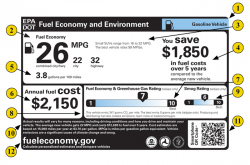
— A $1.2 billion Ford fuel economy lawsuit has been dismissed by a Michigan federal judge who ruled fuel economy and mileage estimate claims are preempted under federal Environmental Protection Agency laws.
The Ford fuel economy lawsuit was consolidated from several lawsuits, spanning about 1,100 pages which include 311 counts against Ford regarding 2019-2020 Ford Ranger and 2018-2020 F-150 trucks.
Ford says none of this would be happening if it wasn't for Ford itself announcing in February 2019 that it had opened an internal investigation following employee reports of possible problems with gas mileage estimate testing.
The automaker hired an outside company to investigate emissions and gas mileage tests used for 2019 Ranger trucks and other models.
The Ford fuel economy class action lawsuit alleges the F-150 and Ranger trucks were sold even though Ford knew it had cheated on fuel economy standards.
According to the plaintiffs who sued, they were fooled by the window stickers related to fuel economy estimates, such as the window label (Monroney label) for a 2018 Ford F-150 V6. The fuel economy lawsuit alleges the 2018 F-150 was advertised as having fuel economy estimates of 20 mpg for city and 26 mpg for highway driving.
But the class action lawsuit alleges the real city driving mpg estimate is 17.7 mpg and the highway fuel economy estimate is 22.7 mpg.
According to the fuel economy lawsuit, the plaintiffs and all F-150 and Ranger owners are forced to pay thousands of dollars more for fuel because Ford cheated on tests.
Ford Fuel Economy Lawsuit Dismissed
From the beginning, Ford has argued all claims in the fuel economy lawsuit must be dismissed because the claims are preempted under federal law, and Judge Sean F. Cox agreed.
Ford points out, “EPA fuel economy estimates are not, and have never been, guarantees of real-world fuel economy performance.”
The judge agreed and said as the EPA itself has stressed, mileage will vary and its fuel economy “ratings are a useful tool for comparing the fuel economies of different vehicles but may not accurately predict the average [miles per gallon] you will get."
In its motion to dismiss the fuel economy lawsuit, Ford told the judge the plaintiffs are ignoring the word "estimated" when it comes to fuel economy ratings.
Ford also argues the plaintiffs try to replace Congress and the EPA regarding window labels with fuel economy estimates, the key word being, "estimates."
According to Judge Cox, the Monroney label (window sticker) must also include a disclaimer indicating that ‘[a]ctual results will vary for many reasons, including driving conditions and how you drive and maintain your vehicle.”
According to the judge, when designing the Monroney label, regulators said the label must contain a “statement . . . informing the buyer that the values on the label are not guaranteed[.]”
The judge also says the EPA has always said its required fuel economy estimates are not and can never be “perfect” figures that can predict the performance of each vehicle for each driver under all conditions.
Ford also argues the EPA itself says on-road testing, "will often yield different results than those obtained under the EPA’s testing process."
In addition to dismissing the fuel economy lawsuit because the claims are preempted by federal law, the judge also found several of Ford's arguments to have merit.
In the order from the judge, the plaintiffs lack standing to assert claims arising under the laws of the 22 states where no named plaintiff claims to reside or been injured.
Judge Cox also ruled the claims against Ford are barred under the doctrine of primary jurisdiction, and misrepresentation-based consumer fraud and consumer protection claims fail for additional reasons.
"Plaintiffs’ representative claims brought under the consumer protection statutes of several states are subject to dismissal based on statutory class-action bars; Plaintiffs’ breach of contract claims are subject to dismissal because Plaintiffs do not allege the existence of an enforceable contract with Ford; Plaintiffs’ express warranty claims are also barred by federal and state laws." — Judge Sean F. Cox
The judge also dismissed Magnuson-Moss Warranty Act claims for failure to allege sufficient pre-suit notice.
The Ford fuel economy lawsuit was filed in the U.S. District Court for the Eastern District of Michigan, Southern Division. The case is: In Re: Ford Motor Co. F-150 and Ranger Truck Fuel Economy Marketing and Sales Practices Litigation.
The plaintiffs are represented by the Miller Law Firm, P.C., Hagens Berman Sobol Shapiro LLP, and DiCello Levitt Gutzler LLC.




